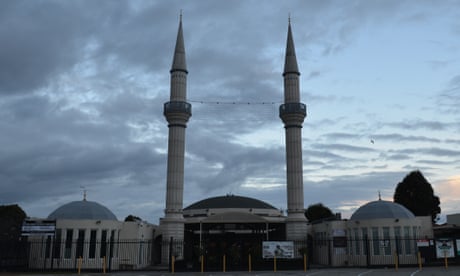- by foxnews
- 08 Apr 2025
Coalition?s religious discrimination bill sends ?dangerous signal?, Muslim groups say
Coalition’s religious discrimination bill sends ‘dangerous signal’, Muslim groups say
- by theguardian
- 28 Dec 2021
- in news

The government's religious discrimination law could place "a heavy burden" on already marginalised Muslim communities because it allows discrimination on national security grounds, Islamic organisations have said.
Scott Morrison has said the proposed legislation should "give Australians of faith confidence - confidence to be themselves and confidence in the country they belong to".
But three organisations have raised concerns about a section of the bill that says it is not unlawful "for a person to discriminate against another person on the ground of the other person's religious belief or activity" for national security reasons.
The exemption applies if the person discriminating "is performing a function or exercising a power relating to law enforcement, national security or intelligence under a law or program of the commonwealth".
The bill says "the conduct constituting the discrimination" must be "reasonably necessary in performing the function or exercising the power".
The Australian Muslim Advocacy Network (Aman) said the proposal "imposes a heavy burden on Muslim communities who are already marginalised and feel highly vulnerable".
"There is absolutely no legal justification for authorities to discriminate against communities or people based on their faith," the network said in a submission to the parliamentary joint committee on human rights.
"Their work is to assess and prevent the risk of violence."
The government has argued the bill is needed to prohibit direct and indirect discrimination on the grounds of religious belief or activity in work and other areas of public life.
Aman argued other parts of the bill provided "a much-needed safeguard" from discrimination, but the exception clause "sends a dangerous signal to law enforcement that religious discrimination against Muslims will continue to be necessary".
It cited an Australian Human Rights Commission survey that found the most common situations in which Australian Muslims reported experiencing unfavourable treatment included when dealing with law enforcement. This was nominated by half of all respondents.
Aman said Australia's definition of terrorism included a motive of religious, political or ideological causes. According to the submission, the idea of a religious cause of terrorism "propagates the lie that Islamic religiosity leads to terrorism" and had also "legitimised Isil movements".
Authorities and the media labelled the activities of Islamic State and other overseas terrorist groups as religiously-motivated, the submission said, "even though their actions would be sufficiently and more appropriately covered under 'ideological' or 'political' cause".
"This submission notes that authorities do not refer to white supremacists as 'patriotically motivated' or 'patriotic cause', even though that is how they may refer to themselves," Aman said.
The Islamic Council of Victoria also called for the removal of the exemption, saying it would "enable law enforcement and security agencies to allow biases, stereotypes and unfair procedures to govern their functions and powers".
"Muslims have long been subjected to racial profiling and targeting under the guise of national security," the council said in its submission.
"The introduction of [this section] will only make it clear that the commonwealth government believes that religion is a legitimate basis for discriminating against individuals and religious groups."
The Australian National Imams Council told the committee the exception appeared to be "unduly broad in the protection which it provides".
"If such a provision operates to provide a broad exemption to law enforcement, national security and intelligence functions, it risks alienating Muslims and creating a sense of mistrust given the experiences of coercive and investigative powers being misused," the council said.
The bill says the definition of national security includes the process of granting, revoking or denying Australian government security clearances.
A spokesperson for the attorney general, Michaelia Cash, said the exception was "not directed towards any specific religion".
It was "necessary to ensure that nothing in the bill interferes with the ability of bodies that perform law enforcement, national security and intelligence functions, or exercise associated powers, to continue to protect Australia's national security".
"The exception recognises that, in some circumstances, a person's religious belief or activity may have a connection to law enforcement, national security or intelligence," the spokesperson said.
"For example, criminal or terrorist acts may be motivated by certain religious beliefs, and so those beliefs would be relevant to a law enforcement investigation."
Cash's spokesperson said the exception was "subject to limitations that ensure the exception is a reasonable limitation on the rights to equality and non-discrimination".
When the prime minister introduced the bill to parliament in late November, he said: "To deny protection from discrimination for their religious beliefs is to tear at the very fabric of multiculturalism in this country."
But the government was unable to pass the bill before parliament rose for the summer break amid unresolved internal divisions, including over a push from moderate Liberal MPs to protect gay students from discrimination in religious schools.
The human rights committee is due to complete its report by 4 February, shortly before the scheduled resumption of parliament. The Senate's legal and constitutional affairs legislation committee is also conducting an inquiry into the bill with the same deadline.
Labor has reserved its position until the inquiries are complete, with leader Anthony Albanese saying he supports religious freedom but also declaring changes should not come at "the expense of discriminating on the basis of other people's characteristics".
- by foxnews
- descember 09, 2016
Ancient settlement reveals remains of 1,800-year-old dog, baffling experts: 'Preserved quite well'
Archaeologists have recently unearthed the remarkably well-preserved remains of a dog from ancient Rome, shedding light on the widespread practice of ritual sacrifice in antiquity.
read more


